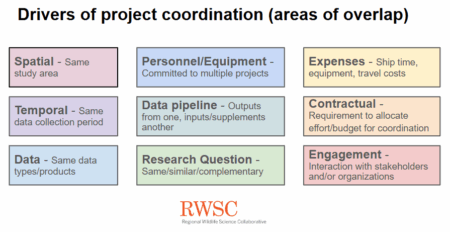ROSA aims to foster collaboration and streamline efforts across the East Coast to address the complex intersection of offshore wind development and fisheries.
Our funder coordination initiatives and resources aim to bridge gaps in knowledge, promote efficient resource use, and create shared frameworks for research and data management. By prioritizing regional coordination, we support the production of standardized, actionable science needs to support research funders, developers, and the broader community.
ROSA encourages all types of funders to consider using the below resources and adopting the below policies and practices to foster effective collaboration, transparency, and strategic alignment in fisheries and offshore wind research initiatives.
Funder Coordination
Joint Offshore Research Funder Coordination
in collaboration with RWSC

As a result of recent RFP processes, there are more than 35 new projects that will begin multi-year field, modeling, and analysis activities beginning in late 2025 and early 2026. There is an opportunity for funders of these new projects to meet and identify specific and discrete coordination activities that each funder can ask their awardees to implement. For example, one project may collect data that another project can use as a model input, or two projects may be examining the same parameter/phenomenon but in different geographies and could perhaps align methods and make data interoperable.
In Fall 2025, ROSA and RWSC held several meeting for funders, awardees, and interested public to understand the full breadth of newly-funded projects and facilitate coordination between projects for effective use of resources.
September 2025 Slides Available Here
ROSA Offshore Wind and Fisheries Funder Coordination
Beginning in May 2024, ROSA convened all types of funding entities on the east coast to optimize research and monitoring dollars for fisheries and offshore wind. The meetings are held twice a year to bring together Atlantic Coast research funders to:
- Avoid duplication by tracking ongoing research and planned solicitations and highlighting pertinent filled and remaining data gaps
- Align solicitation policies such as data management, intellectual property rights, conflict of interest and others
- Encourage and produce offshore wind fisheries research and monitoring data that is Findable, Accessible, Interoperable, and Reusable (FAIR)
Funder Resources
Funding to Address Research Gaps
- FishFORWRD & Research Gaps Analysis
- Funders are encouraged to utilize the Research Gaps Analysis Tool within FishFORWRD to guide internal prioritization and ensure both solicitation topic areas and eventual project selected are non-duplicative and fill a research need.
- More information on the tool and how to use it can be found here.
- RWSC Planning Map
- ROSA is collaborating with RWSC on a Research Planning Map that displays the locations (points, transects, areas) where wildlife, fisheries and environment data are being collected to support offshore wind research. This version of the map is incomplete and does not represent all the ongoing research and data collection activities with respect to offshore wind. Learn more about the plan to build and maintain this tool here.
Solicitation & Contract Alignment
- Regional Coordination Request
- This language provides specific tasks from both funders and researchers to promote regional coordination of fisheries and offshore wind research and monitoring initiatives. ROSA encourages funders to include this language within solicitations and integrate these tasks into agreements. Researchers should include these activities in their proposals. View language here.
- Data Policy
- ROSA Data Policy available here
- The Policy will apply to research supported by ROSA Regional Research Funds and was designed to help inform other policies, contracts, and agreements so that wildlife, fisheries, and offshore wind research can advance knowledge, be used in decision-making, and have wide utility to researchers, government agencies, and others. We encourage funders to consider adopting this language to standardize data availability of wildlife and fisheries offshore wind research.
- ROSA Data Policy is adapted from RWSC policy available here
- Data Management & Sharing Plan
- A Data Management and Sharing Plan (DMSP) is a formal document that outlines how research data will be handled, stored, shared, and preserved throughout the lifecycle of a project. The plan should demonstrate the researcher’s commitment to good data management practices (e.g., FAIR: Findable, Accessible, Interoperable, Reusable) and ensure that data are available for future research.
- ROSA is currently developing a comprehensive Post-Award DMSP template, informed by updates from our Data Governance Program. An example of a Pre-Award DMSP, used during the application phase of our RFP process, can be accessed here. We encourage funders to include a data management component in their solicitations, prompting researchers to consider the full lifecycle of offshore wind fisheries data.
- Meaningful Fishing Industry Involvement
- ROSA recommends that funders encourage researchers to partner with the fishing industry to promote a more inclusive and collaborative approach to offshore wind fisheries research. Meaningful partnership could include:
- Fishing industry participation in project development
- Fishing industry representation on project teams and project advisory boards
- Use of local fishing vessels in deployments
- Collaboration with fishing industry to validate and interpret research results
- ROSA recommends that funders encourage researchers to partner with the fishing industry to promote a more inclusive and collaborative approach to offshore wind fisheries research. Meaningful partnership could include:
Active Funding Opportunities
In addition to the funded projects within FishFORWRD, funders are encouraged to review the research topic areas listed in the solicitations below to avoid duplication of efforts and direct new funding opportunities toward addressing research gaps.
-
- Massachusetts Division of Marine Fisheries | Fisheries Innovation Fund
- Maine Governor Energy Office | Bluetech Innovation and Monitoring at the UMaine Demo Floating Turbine
- New Jersey Research & Monitoring Initiative | Addressing New Jersey’s Highest Priority Research and Monitoring Needs for Environment, Wildlife, and Fisheries Associated with Offshore Wind
- Northeast Sea Grant Consortium | Fisheries and Offshore Wind Interactions RFP – 2024
Last updated September 2025